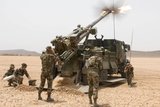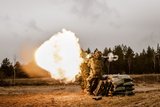US sending B-52s to Middle East against Iran 'threat'
The US Air Force is deploying massive B-52 Stratofortress bombers to the Gulf in response to an alleged possible plan by Iran to attack American forces in the region, the Pentagon said 7 May.
Several nuclear-capable B-52s are heading to the region along with an aircraft carrier task force following what the Defense Department called ‘recent and clear indications that Iranian and Iranian proxy forces were making preparations to possibly attack US forces.’
‘The deployment of the USS Abraham Lincoln Carrier Strike Group and a bomber task force are considered a prudent step in response to indications of heightened Iranian readiness to conduct offensive operations against US forces and our interests,’ said acting Pentagon spokesman Charles Summers in a statement. ‘We emphasize the White House statement that we do not seek war with the Iranian regime, but we will defend US personnel, our allies and our interests in the region.’
The deployment was first announced late Sunday by John Bolton, President Donald Trump's national security advisor, who said the move was ‘a clear and unmistakable message to the Iranian regime that any attack on US interests or on those of our allies will be met with unrelenting force.’
The US move comes in response to intelligence about a threat orchestrated by Iran, officials said, but details of the threat have not been disclosed.
Navy Captain Bill Urban, the spokesman for the US military's Central Command, which spans the Middle east, said the threat could be land-based or maritime. He said the Lincoln strike group was already scheduled to head to the region on long-planned deployment but that its arrival in the Gulf has been accelerated due to the threat.
That led to the cancellation of a planned port visit by the Lincoln to Split, Croatia.
The multinational carrier group, including several ships, multiple types of aircraft, and 6,000 personnel, will be deployed ‘where it will best be able to protect US forces and interests in the region and to deter any aggression.’
The deployment comes a year after Trump pulled the US out of a multinational accord under which Tehran drastically scaled back its sensitive nuclear work. Since then, the Trump administration has ramped up menacing rhetoric against Iran while tightening economic sanctions on the country.
More from Defence Notes
-
![Venezuela prepares personnel and equipment for a potential second US attack]()
Venezuela prepares personnel and equipment for a potential second US attack
Defence Minister Gen Vladimir Padrino López has declared that the Venezuelan armed forces “will continue to employ all its available capabilities for military defence”.
-
![How might European countries look to tackle drone incursions?]()
How might European countries look to tackle drone incursions?
Disruption of infrastructure in Europe, whether by cyberattack, physical damage to pipelines or uncrewed aerial vehicles flying over major airports, as has happened more recently, is on the rise. What is the most effective way of countering the aerial aspect of this not-so-open warfare?
-
![Taiwan approved for $11 billion weapon purchase from US]()
Taiwan approved for $11 billion weapon purchase from US
The US State Department’s approval of a multi-billion-dollar sale of weapons to Taiwan includes tactical mission networks equipment, uncrewed aerial systems, artillery rocket systems and self-propelled howitzers as well as anti-tank guided missiles.
-
![Ireland spells out $2.3 billion shopping list in five-year defence spending plan]()
Ireland spells out $2.3 billion shopping list in five-year defence spending plan
Ireland’s multi-annual investment in capital defence spending is set to rise from €300m in 2026 to €360m in 2029–2030 with major upgrades across land, air, maritime and cyber domains.
-
![Canada to deepen integration of multi-domain capabilities to strengthen its defences]()
Canada to deepen integration of multi-domain capabilities to strengthen its defences
The Canadian Department of National Defence has created new organisations to manage the procurement and integration of all-domain solutions and allocated US$258.33 million to strengthen production capacities.
























